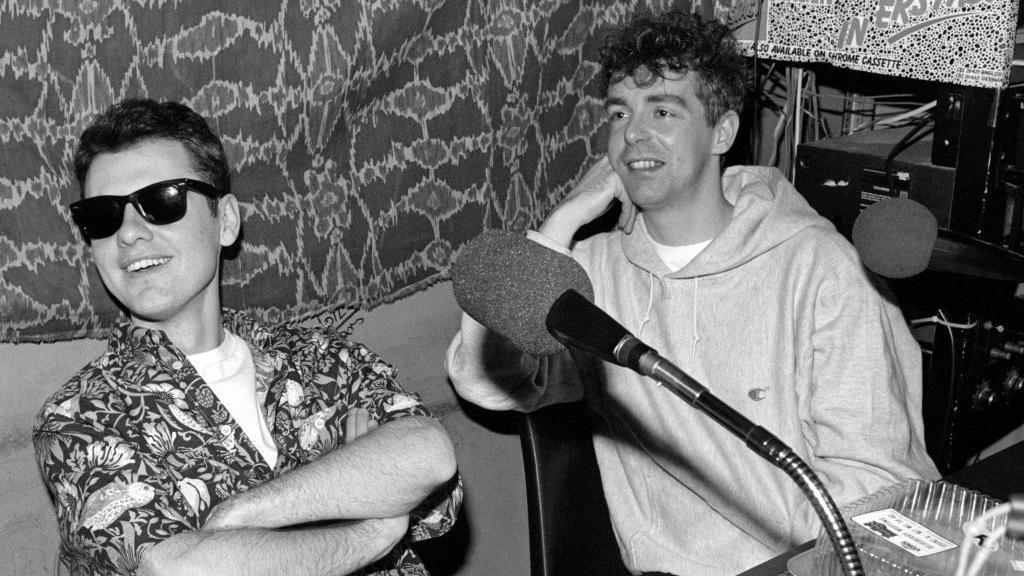Pet Shop Boys: 'We should call our next tour Farewell'

The Pet Shop Boys formed in 1981, and released their first single three years later
- Published
“I don't like spiral staircases,” says Chris Lowe. “And that’s the first time that’s come out in an interview.”
Call it an exclusive. You heard it here first. The Pulitzer is in the post.
The revelation comes as we discuss the origins of the Pet Shop Boys, one of the UK’s most important and influential bands.
This year marks the 40th anniversary of their debut single, West End Girls - a claustrophobic trawl through London's nightlife that launched a four-decade voyage into smart, irresistible pop.
But before they were Pet Shop Boys, the duo had other lives. And that’s where we join them, reminiscing about the days before they bumped into each other at a Chelsea electronics shop and a musical partnership was born.
Neil Tennant, erudite frontman and lyricist-in-chief, grew up in Newcastle, attending the strict, all-boys St Cuthbert's Catholic School that later inspired songs like It’s A Sin.
Aged 18, he left to study history in London before taking a job at an insurance office. It was the height of the glam rock era, and he embraced the androgynous look of his musical hero, David Bowie.
“I used to walk down the Kings Road in a white tank top and women's shoes with big platform heels,” he recalls. “Gay men used to make comments as I walked down the road.”
“That’s how you dressed for work in the insurance brokers?” asks his bandmate, apparently hearing the story for the first time.
“The guy I worked for was very gay,” Tennant explains. “He’d lived through the ‘60s and he used to take me out for lunch and tell stories about The Rolling Stones.
“I think he might have had a thing for me, but I didn’t realise it at the time.”
Lowe, meanwhile, was in Liverpool training as an architect, incubating his dislike of twisty stairs (the geometry is fiendishly difficult, apparently).

The band have had 47 hit singles in the UK, including four number ones
“Every so often, you’ll go into a hotel room and it'll have two levels joined by a spiral staircase,” he observes.
“Well, I can’t stay. I have to walk out.”
After their chance meeting in 1981, the duo started making demos in a studio off Camden Road, paid for by Tennant's job at Smash Hits magazine.
“Our ambition was simply to make a record with [New York dance producer] Bobby O, and for it to be available on import in the Record Shack shop on Brewer Street,” he says.
They achieved their goal.
Tennant was sent to New York to interview Sting, and used the opportunity to introduce himself to Bobby O.
He agreed to release West End Girls on his own label, and it became a minor club hit in the US and Germany.
By the end of 1984 it was available on import in London, and when the band re-recorded it two years later, it went all the way to number one.
“Radio stations jumped at it because they knew the original and they were eager to play it,” says Tennant.
“And once you've started on this journey you want to carry on with it.”

An early radio interview, at KROQ in Los Angeles, 1986
Fifty million record sales later, the band are about to release their 15th studio album, Nonetheless, which marks a return to the maximalist sound of their heyday, after three records of what Tennant calls “electronic purism”.
Strings grace every track, from the soaring love song Feel to the stately groove of Love Is The Law.
A sense of hope and possibility infuses the record - paradoxically so, given that it was written during the Covid lockdowns of 2020 and 2021.
“I’d just moved into a new house and I felt quite euphoric about it, really.
"Dancing in my kitchen, walking in the countryside... The pressure of our life had been removed.”
Isolated at home, the duo traded demos over email. Tennant even downloaded GarageBand and learned to record his own vocals for the first time.
'Priceless' Pet Shop Boys letter found in record shop
- Published25 February 2023
Going behind the scenes with the Pet Shop Boys
- Published22 March 2020
Pet Shop Boys: 'We don't think about the old stuff'
- Published5 September 2012
With time to spare, he also re-recorded some of the folk songs he’d written as a teenager.
“It's amazing you could remember them,” Lowe marvels. “Hadn't you ever put them onto a tape recorder?”
“Yes, but I don’t have the cassettes any more," Tennant replies. "I just think, if the songs are any good, you can remember them.”
There are “no plans” to release those nascent tunes, he adds, indicating he'd rather keep them as personal mementoes.
Nonetheless, Nonetheless contains several flourishes of acoustic guitar - and one song that specifically references lockdown (Why Am I Dancing?, which finds Tennant shuffling around the kitchen, alone but happy, as the music swells around him).
Elsewhere, he writes about whatever takes his fancy. There's a ballad about Russian ballet dancer Rudolf Nuryev “jumping the barrier at Orly Airport” to claim asylum; and a song written from the perspective of Donald Trump’s reluctant bodyguard.
“If my number’s up, I’ll take a bullet for Narcissus.”
A recent study suggests, external pop lyrics have become simpler and more self-obsessed since the Pet Shop Boys' 1980s imperial phase.
Tennant, whose songs are often doused in social commentary (Integral, external deals with ID cards, Shopping, external tackles insider trading and government corruption), isn't impressed.
“One of our beliefs is that you can write a song about anything, literally anything, as long as it’s interesting,” he says.
We happen to be talking in the same week that pop’s diarist-in-chief, Taylor Swift, releases her latest album.
So what do The Pet Shop Boys make of her oeuvre?

Taking a starring role at the closing ceremony for the London 2012 Olympics
“I'd be very interested, if I'm still alive, to see how Taylor Swift is regarded in years to come,” says Tennant, “because she has this massive success - but normally with people with massive success, there's a popular legacy of songs that everyone knows.
“If you're Michael Jackson, who doesn’t know Billie Jean or Beat It? With Taylor Swift I never feel it's the moment where your grandmother knows her song.”
Is that simply a function of our fractured media age, I ask? Swift has to compete with the noise of social media and TV-on-demand and streaming services where 100,000 songs are uploaded every day, external.
“But we all know Harry Styles’ As It Was,” argues Lowe.
“I know it, and I’m old enough to be a grandmother,” Tennant adds.
“Speaking as a grandmother, you are aware of Harry Styles,” laughs his bandmate.
'Is everyone gay?'
This isn’t a criticism of Swift, they stress. After all, Tennant isn’t averse to personal lyrics when the occasion demands.
Take, for example, New London Boy. One of their album’s most beguiling songs, it finds the singer reminiscing about his arrival in the capital, 51 years ago.
Synths shimmer like a flashback sequence as he describes leaving his “invented life” in Newcastle and “unlocking the secret of me” on the city’s streets.
“Are they girls or boys? Is everyone gay?” he wonders, his eyes opening to a new life. “Am I just kidding myself [that] I’ll go all the way.”
“Going all the way’, is a sexual reference," he explains, "but it’s also about my ambitions to be a singer".
"And in those days I had a girlfriend, so it’s about bisexuality a bit as well.”
He’s described the song as “what happens between verses two and three of Being Boring”, the classic PSB single, external about partying in London with his childhood friend, Chris Dowell, who later died of Aids-related illnesses.
The wistful and evocative atmosphere of New London Boy is ruptured by a spoken-word section, where Tennant describes the threat of violence that stalked the gay community in his youth.
“Newcastle was terrifying in the 70s,” he says.
“The only time I’ve ever been punched was by a skinhead, when I was waiting for a bus. I brought that paranoia down to London with me.”
He took solace from the story of a drag queen who was attacked outside Newcastle’s Eldon pub in the 1970s. Alert to danger, she'd come prepared, and sent the skinheads scattering by wielding a handbag that concealed a hefty brick.
“I like the idea that someone would fight back,” says Tennant, “but I’ve still never had a handbag of my own.”
Today, his encounters with the public are much more genteel. The Pet Shop Boys have an "acceptable level" of fame, where they can catch the tube or cycle through their second home in Berlin without being harassed.
“We’re always out on the street, so if someone says, ‘Oh, can I get a selfie?’, I'm generally very surprised,” Tennant says.
“I sort of forget that I'm me!”
That won’t be a luxury he can enjoy for the rest of 2024.
As well as the new album, the Pet Shop Boys have extended their ongoing Greatest Hits tour, written a musical based on The Emperor’s New Clothes, and will stage their third residency at London’s Royal Opera House in June.
They love playing there – relishing the opportunity to turn Covent Garden’s citadel of high culture into a throbbing nightclub, even if it doesn’t make financial sense.
“We could make five times more money playing the O2 arena for one night,” Tennant observes.

On stage at the Royal Opera House during their last residency in 2018
Shortly after the residency, the singer reaches his milestone 70th birthday. Has he ever considered retiring?
“It's not on the agenda, per se," says Tennant, "but who knows?"
“The touring gets a bit much,” Lowe points out, archly suggesting their next tour will be called "Farewell, given how long this one's gone on".
But the Pet Shop Boys show no signs of slowing down. Songs are being written, concepts are frothing up, and there is lunch to be had.
A debate ensues: Get sandwiches now, or at the record label this afternoon?
Tenant is happy to drop into Pret A Manger (although he vetoes the BBC tagging along, after we suggest the headline “Pret Shop Boys”) but the offer of salmon-on-rye from Danish eaterie Ole & Steen is potentially more tempting.
The conversation continues out of the studio and into the bowels of the BBC. The band shun the lift, however, leaving just one exit option: A spiral staircase.
“Ugh, I hate these,” says Lowe. “Never again.”